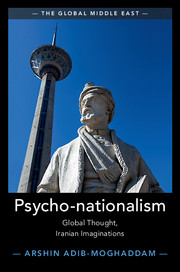Book contents
- Psycho-nationalism
- The Global Middle East
- Psycho-nationalism
- Copyright page
- Dedication
- Contents
- Introduction: Love and Politics
- 1 National Hysteria: Roma O’ Morte
- 2 International Hubris: Kings of Kings and Vicegerents of God
- 3 Geographic Dislocations: Iran Is in India
- 4 Religious Neuroses: Islam and the People
- 5 Un-national Therapy: Freedom and Its Discontents
- 6 Sexing the Nation: Subversive Trans-localities
- Bibliography
- Index
2 - International Hubris: Kings of Kings and Vicegerents of God
Published online by Cambridge University Press: 07 December 2017
- Psycho-nationalism
- The Global Middle East
- Psycho-nationalism
- Copyright page
- Dedication
- Contents
- Introduction: Love and Politics
- 1 National Hysteria: Roma O’ Morte
- 2 International Hubris: Kings of Kings and Vicegerents of God
- 3 Geographic Dislocations: Iran Is in India
- 4 Religious Neuroses: Islam and the People
- 5 Un-national Therapy: Freedom and Its Discontents
- 6 Sexing the Nation: Subversive Trans-localities
- Bibliography
- Index
Summary
I have argued that psycho-nationalism targets our cognition, our way of thinking about us and the community that we imagine as our nation. To that end, there exists a dense system of norms, institutions, bureaucracy and other machinations of the state that are intimately tied up in order to simulate the reality of ‘us’ which always also implies some form of aggression towards the ‘other’. This overemphasis on the ‘self’ as a means to narrate the national community and its borders, begets a form of ‘nationalistic narcissism’. In this way psycho-nationalism is not only played out as domestic politics. The nation-state is not merely something our politicians construct in their day-to-day interference in our daily lives. In fact, the nation-state is always also constructed in global politics. Nationalistic narcissism gives impetus to a hubristic self-perception of the in-group, i.e. those that are considered to be a part of the nation. There is no better place than the international system to portray, enact and solidify such emotions. In other words: the international system is the place where the nation-state takes its ‘selfies’ and where it posts them to the rest of the world. In many ways, this global space can be described as the ‘Instagram’ of identity politics.
When successive US presidents recurrently claim to be the ‘leader of the free world’, they are communicating this message both to domestic constituencies and to other actors in the international system. Psycho-nationalism, is both an internal strategy and an external one. If domestic politics is the realm of psycho-nationalist mind games targeting the general populace, foreign policy is about imagining the place of a country among the community of nations. The international affairs of a country are about claiming a status, questions of dignity, identity, reputation, emotions and words. In the Iranian case, certainly in the periods covered in this book, foreign policy has always also been about imagining global grandeur. Contemporary Iranian leaders, more professionally since the reign of Reza Shah (1921–41), did not tend to limit the international relations of the country to issues of survival and a narrow understanding of the ‘national interest’. Even in the absence of material resources justifying their self-perception, Iranian leaders have claimed and aspired to regional and global power. Hence they have routinely subscribed to an Iranocentric perception of the world that has repeatedly lent itself to political hubris.
- Type
- Chapter
- Information
- Psycho-nationalismGlobal Thought, Iranian Imaginations, pp. 45 - 67Publisher: Cambridge University PressPrint publication year: 2017

